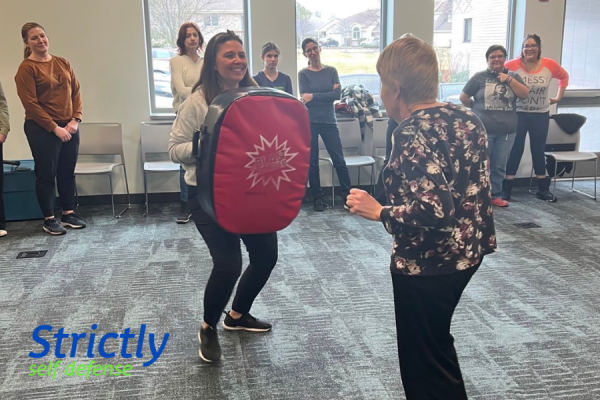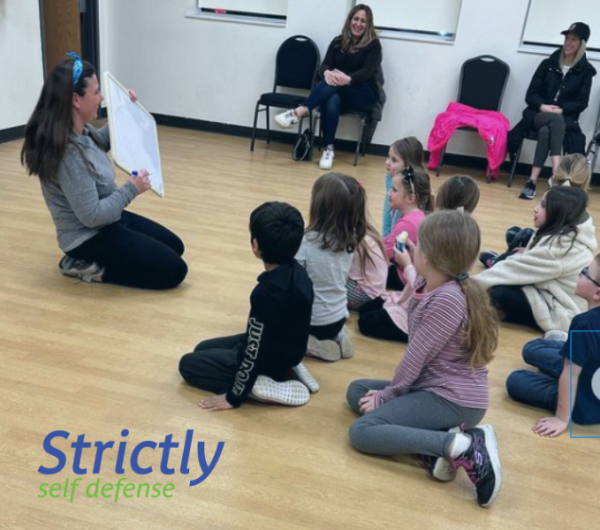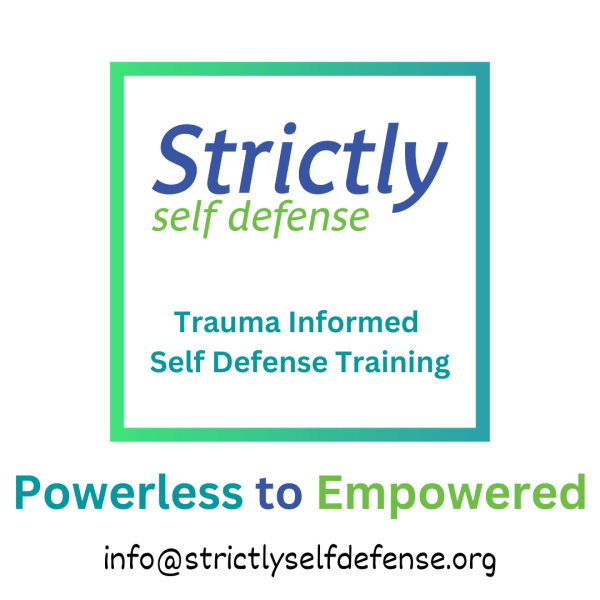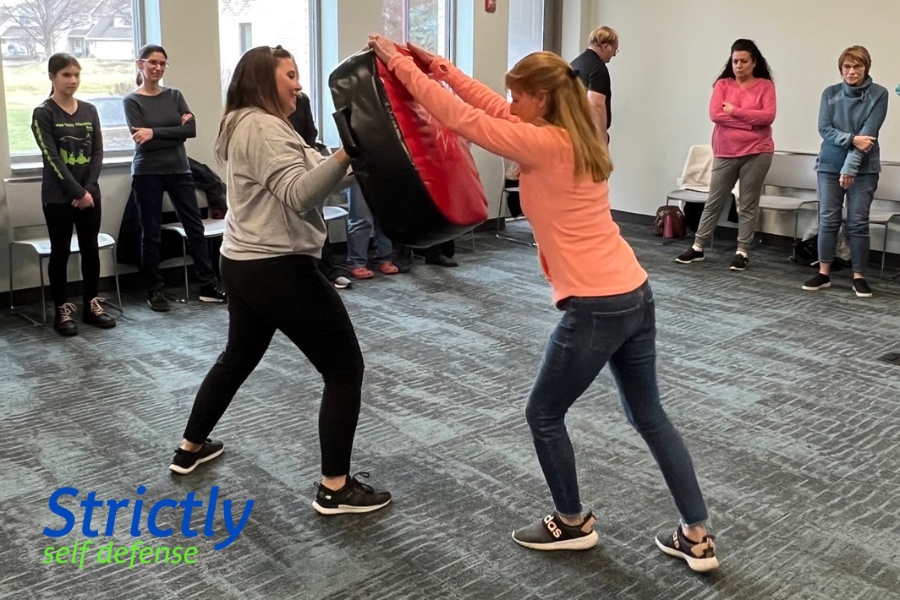A group of students assume a basic strike stance in unison, with their feet planted apart and their hands raised. They are learning how to defend themselves in a violent encounter, by aiming for target areas on the perpetrator’s body.
This is part of the training offered by Strictly Self Defense at College of DuPage. Participants are led by Lindsey Daehnke, who is a self-defense trainer, professional martial artist and COD alumna. She created Strictly Self Defense in 2021 and describes the organization as a combination of her passion for helping people and her love for martial arts.

“I used to volunteer my time to teach self-defense classes when friends would ask me to do so for scout troops or other community groups,” Daehnke recalled. “I would leave feeling so good about empowering others with the life skill of self-defense. My motivation was to offer self-defense to those who may not want to train in the martial arts as a long-term commitment, but would still like to be prepared should they be in an undesirable situation.”
Strictly Self Defense offers training sessions for all ages, from three-year-old toddlers to the elderly. The workshops are configured to suit the trainees’ abilities, whether it is schoolchildren, fitness groups or survivors of violence. Daehnke has also partnered with the Ray Graham Association to offer self-defense training to people with special needs.
Daehnke’s first venture into combat training began at COD in 1999 when she took a martial arts class to fulfill physical education credits. It reignited her experience as an athlete in youth and high school sports, and she came to deeply enjoy martial arts. She began to compete in national tournaments and is now a third-degree blackbelt in Tang Soo Do and a first-degree blackbelt in Hapkido.
“My favorite part about competing in martial arts championships was learning that the only real competition was myself,” Daehnke mused. “I could show up thinking about what it takes to beat my competitors, or I could show up thinking about how to do my best. The outcome was always better when I focused on myself, rather than my competition. I find the same is true as I continue to learn and grow as an entrepreneur and small business owner. I don’t need to do what others are doing; I only need to do what I do and do it to the best of my ability.”

With over 24 years of experience now, Deahnke incorporates principles from martial arts in her self-defense training.
“Tang Soo Do offers a variety of offensive techniques that can be very effective in self-defense when we need to strike our attacker in order to create the space and time necessary to get away,” Daehnke said. “Hapkido is also highly effective but uses the unexpected skill of control to get out of an undesirable situation, such as being grabbed. I use basic concepts from both styles in my workshops to help attendees understand how to have ‘power’ in every strike and ‘control’ in every escape.”
Self-defense training entails a balanced use of basic strikes and kicks, with distraction and escape techniques. For trainees who can’t physically overpower or fight a perpetrator, these strategies are vital. The training offered by Strictly Self Defense also goes beyond physical action and includes mindset training, like how to have situational awareness, identify danger warning signs and have a confident demeanor.
A central aspect of Strictly Self Defense’s mission is offering trauma-informed training. Daehnke is trained as a medical advocate for survivors of sexual assault. She offers unique recovery training for attendees who have faced violence and want to learn how to defend themselves in the future.
“They may have experienced domestic violence, sexual assault, abuse, bullying, a mugging or carjacking,” Daehnke explained. “It is important to free them from thoughts that that negative experience was their fault. I try to help them eliminate the self-blaming and shaming that is common and also let them know that anyone in their life that is blaming them or shaming them for the situation is not a good support person.”
Having a safety network of close people is important for victims, which Strictly Self Defense reinforces. For children, it’s their parents and teachers. For students on campus, a safety network may be faculty and counselors to whom they can report instances of harassment. Daehnke also encourages trainees to acknowledge mental health issues after traumatic incidents and how to create a self-defense mindset to move forward.
“I help attendees understand how their brain plays a huge role in their ability to escape from a self-defense scenario,” Daehnke said. “I also encourage attendees to seek support following an attack so that they can talk through the situation, rather than burying it inside and having it grow into something that is too hard to deal with later.”
This can apply to young adults in college who face interpersonal violence, hazing, bullying and sexual assault. Statistics gathered by the Rape, Assault, Incest National Network (RAINN) show that college students aged 18-24 experience sexual violence at higher rates, especially women in college who are three times more likely than women in general. Universities have Title IX policies for safe conduct and reporting sexual harassment.
COD’s Title IX Coordinator, Assia Baker, encourages students to participate in self defense programs, as well as training that teaches students how to have safe social networks.
“During the college experience, students will have a variety of relationships to navigate,” Baker said. “It is important to understand one’s values and what that looks like in relationships. That understanding of values, along with some basic relational skills, can help students build healthy relationships, including healthy romantic relationships. Overall, the goal is for College of DuPage students to feel self-empowered and be able to actively assist peers if needed.”
Students can access the Formal Discrimination and Harassment Incident Reporting Form on the COD website, and the department also offers pregnancy and parenting accommodations. Baker also encourages students to partake in the 360staysafe virtual training modules, as well as periodic active violence preparedness training. The department hopes to offer self-defense sessions twice a semester.

“Self-defense training for college students and young adults can provide them with a mindset shift that allows them to think differently and make smart choices,” Daehnke said. “It also provides options for physical skills that could be used to escape a situation or minimize the risk of injury to themselves. By having a plan, we are prepared to act quickly. Ultimately, attending a workshop with Strictly Self Defense empowers the attendees with confidence in themselves and in their plan.”
For students interested in strengthening their self-defense skills, COD offers multiple types of martial arts and self-defense classes in the Physical Education, Fitness and Sports (PHYS) program. They can also participate in another on-campus self-defense training session with Strictly Self Defense on Oct. 18 from 11 a.m. to 1 p.m.







